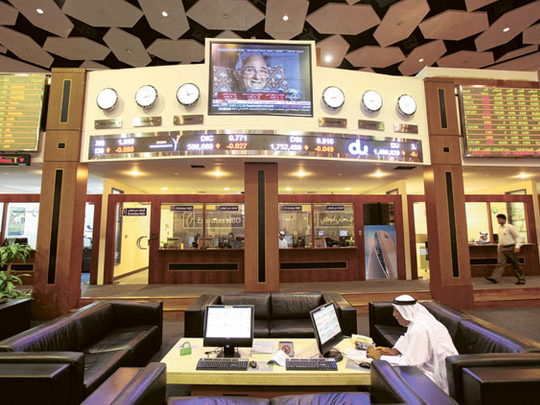
Dubai: Tough market conditions are continuing to take their toll on the UAE's financial brokerages as another company plans to close its doors amid dwindling volumes on regional bourses and growing volatility across global equity indexes.
Shaheen Financial Brokerage, which manages clients trading across the Dubai Financial Market (DFM), the Abu Dhabi Securities Exchange (ADX) and the Dubai Gold and Commodities Exchange, will cease operations in the near future, a senior company official told Gulf News Wednesday without elaborating on the details.
Shaheen was established in 2005 and has a paid-up capital of Dh30 million, according to its profile on the DFM. Dozens of local brokerages have suspended or shut operations over the last few years as costs continue to rise and revenues tumble.
No support
"The financial services industry in the UAE is diminishing because it has been left to sort itself out without any support," said Mohammad Ali Yasin, chief investment officer at CAPM Investment.
"This is a longstanding issue, and with no assistance, low volumes and international competition, it is inevitable more brokerages will close," he added.
Of the 64 brokerages listed by the Securities and Commodities Authority as "active," 56 posted losses in the second quarter, according to financial statements on the regulator's website.
DFM, the only stock market in the Arab world to sell shares to the public, said its net profit declined 46 per cent to Dh14.71 million despite a year-on-year increase in trading values.
According to Ali Yasin, the number of shares traded on the DFM and ADX totalled more than 530 billion in 2008. He said that number has steadily declined over the last few years and UAE volumes year-to-date currently stand at 45 billion; a figure he believes will struggle to reach 70 billion by the end of 2011 at the current annualised rate.
"In terms of total trade volume, the DFM is just 13 per cent of what it was at three years ago. The revenue stream, or the pool of money available for brokerages, has dropped 87 per cent. Initially it was the smaller operations that closed their operations but some of the bigger companies have followed," Ali Yasin said.
"I would not be surprised if more brokerages followed suit by the end of the year. In fact, I expect the closure rate to speed up if there is no significant increase in volume. The top 15 brokerages occupy about 70 per cent of the market share," he added.
Dubai-based investment firm Rasmala announced earlier this year that it was closing down its retail brokerage arm. The financial services sector is shedding staff and brokerages are struggling to make ends meet as the twin debt crises in the United States and the Eurozone continue to have an adverse effect on market sentiment. Shaheen has already started of contacting clients about settling positions and closing accounts.
"At current volumes, 90 per cent of active brokerages are below break even, if not more," said Robert McKinnon, chief investment officer at ASAS Capital.
"The main issue is foreign investors have left the market because it is not a very exciting story to tell in terms of local equities; it is hard to attract new investors with the same old story," he added.












